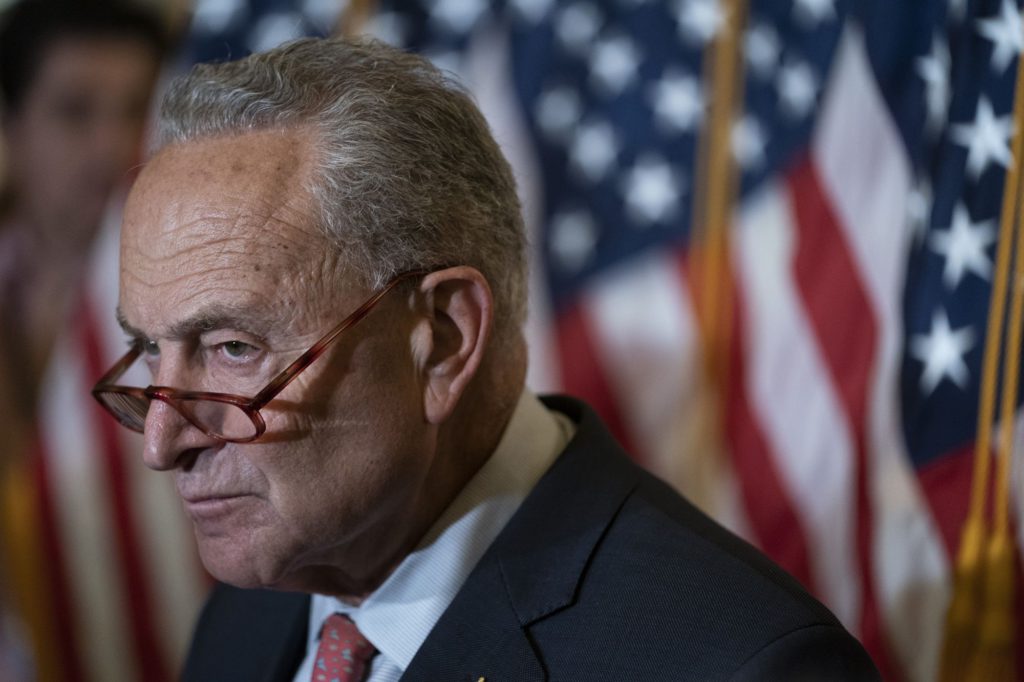(Bloomberg) — Senate Majority Leader Chuck Schumer has told senators to expect a preliminary vote next week on a pared-back China competition bill even as one of the top Republican backers of the legislation called the move a “bluff.”
The legislation would include, at a minimum, $52 billion in incentives and an investment-tax credit for US semiconductor manufacturing, a person familiar with the plans said. But a Republican backer of the bill says it’s doomed if Democrats go through with their plan for a separate package of tax increases and climate measures.
“They don’t have the votes to do it, so this is all a big bluff,” Republican Senator John Cornyn of Texas said Thursday afternoon, adding he would vote “no” if Schumer brought it to the floor next week.
Senator John Thune of South Dakota, the No. 2 GOP leader, said Republicans would have to examine the bill’s contents before they can decide how to vote. But West Virginia Republican Shelley Moore Capito told reporters she would vote to start debate on such a smaller bill.
Schumer plans to hold a vote as early as Tuesday to begin debate on the legislation, but it appears likely he’ll be unable to get past a Republican filibuster.
While some lawmakers and the Biden administration have signaled support for a slimmed-down version of the legislation in order to get the chips incentives passed, others have been urging to include other provisions that may make negotiating a bill more difficult.
‘Out of Time’
Commerce Secretary Gina Raimondo said after briefing House members on Thursday that the chips portion of the bill “is where there’s the most urgency.”
“This isn’t about politics, and we are out of time,” she said. “And if we don’t pass this, we’re going to wake up and other countries will have these investments. And we will say why didn’t we do it?”
The semiconductor incentives have been a top priority for the Biden administration as well as chip manufacturers such as Intel Corp. and companies that are heavy users of chips. While the global semiconductor shortage has eased somewhat, there is still limited production for certain chips used in automobiles and home appliances.
The competition bill has been hung up as lawmakers tried to work out differences between the House and Senate versions of the legislation. Negotiations effectively came to a halt after Senate GOP leader Mitch McConnell threatened to scuttle the bill two weeks ago amid the Democrats’ reconciliation talks.
McConnell on Tuesday opened the door to passing the semiconductor funding by itself, but it was unclear whether he would support adding other provisions that also have bipartisan agreement.
“There are members I have who are not overly fond of USICA but who think there’s a national security aspect to the chips deficit,” McConnell said, using the acronym for the bill’s title. A McConnell spokesman did not have an immediate comment on Thursday about Schumer’s plan to advance a pared-back bill.
Some key senators in both parties are getting behind what’s been dubbed “chips-plus,” a slimmed-down bill with the microchip funding, an investment-tax credit for chips manufacturing and money to speed the roll out of the faster, 5G telecommunications network.
“I’m for as much ‘plus’ as the market will bear, because these are all other good provisions,” Democratic Senator Mark Warner of Virginia said. “It’s more up to our Republican colleagues to make that assessment but, the clock is ticking.”
Asked about the prospects in the House for a narrower bill, Speaker Nancy Pelosi did not rule out the idea but said the legislation should include more than just the semiconductor subsidy.
“We are determined that we will pass a bill,” she said.
(Updates with Raimondo in seventh, eighth paragraphs)
More stories like this are available on bloomberg.com
©2022 Bloomberg L.P.











